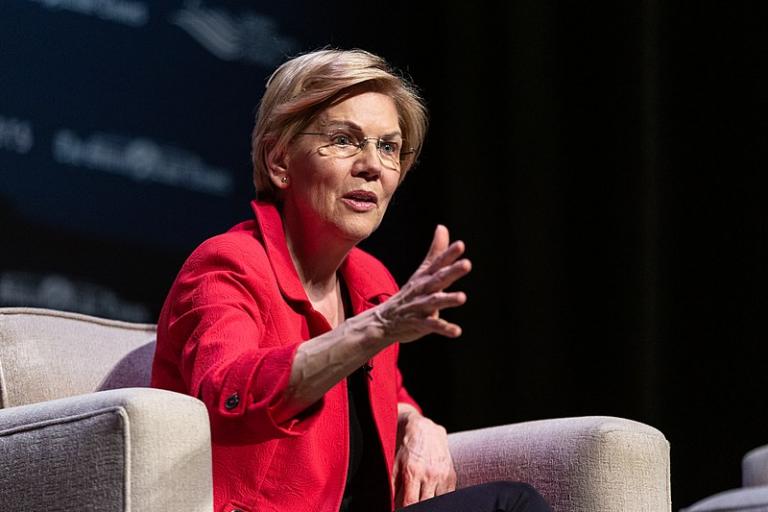We need to address sexism in politics, because too many people, and not just on the right, seem to think it’s a non-issue.
Yes, I am bringing this up because of the Warren / Sanders dispute, but the dispute itself is not the focus of this piece. We are focusing on parsing out the details of a single incident – likely the result of misunderstanding on both sides – instead of taking this opportunity to address the issue it raises.
Why do so many find it plausible that a male politician – even one as progressive as Bernie Sanders – might have, at some point, said something sexist about Elizabeth Warren’s chances at winning a presidential election? It’s plausible because sexism is woven into the entire fabric of our society.
Sexism is the default position of a U.S. citizen.
Otherwise no feminist would ever have to clarify clarify that they are a feminist; supporting gender equality would be taken as a given. One doesn’t have to go about saying “yes, well, I oppose animal sacrifice” – because, that’s a default position in our culture. As being a feminist, unfortunately, is not.
The United States was founded by sexists to be a sexist nation, within a broader civilization predicated on sexism. “All men are created equal” did not, as some like to say, actually mean “all humans” – if it had, there would have been no need for women like Abigail Adams to plea to the men to “remember the ladies” when drawing up a blueprint for a new nation. Her husband did not listen to her, just as for several generations men in power would refuse to listen to the women asking for an equal say in something as basic as voting. Just as for centuries men refused to listen to women such as Hypatia, Christine de Pizan, Emilia Lanier, and Mary Wollstonecraft, who dared to claim equality.
Men today like to say they “gave” women the vote. They did not. We won it, after a long and difficult fight. Others like to act as though granting women voting rights magically made all sexism and prejudice vanish. But the century since has witnessed the ongoing struggle of women to achieve justice in the courts, equality in the workplace, representation in government. On the issue of rape and assault, we have demanded to be heard – and been silenced. We have fought for inclusion in our faith communities – and been shamed and punished for it.
Women in politics today face prejudice and discrimination, from all sides.
When Hillary Clinton faced off against Trump in the 2016 election, she did so with three decades of concerted misogynistic attacks behind her, bearing the tarnish of countless smear campaigns that focused on her refusal to conform to patriarchal ideas about feminine submissiveness. Whatever one thinks about her actual qualifications or policies, the fact remains that many who voted for Trump in 2016 were voting not against the real, actual, individual woman who opposed him, but against a phantom menace gesticulating within their own fevered brains, a monster fabricated by the Limbaughs and Hannitys on their radio waves, constructed out of tatters of male fear and gobbets of male rage.
It is impossible for any woman to take the lead in this society without being judged not according to ordinary expectations for humans, but also according to patriarchal expectations for women. And since the patriarchal image of a woman is of something not entirely human, the more human a woman is the less she seems to be failing in femininity. Our strength is labeled bossiness. Our resolve is stubbornness. Our aggressiveness is rage. Our passion for justice is hysteria. Conversely, of course, feminine traits make us too weak, too acquiescent, too submissive to take the reins of leadership.
Even women on the right, beloved of right wing voters, are handled with sexist gloves by their own fans. They are judged according to their appearance, and their leadership abilities described in such gendered terms as “spunky” or “sassy.” And, of course, their success depends on never standing up against the men who allow them their niche in power. Heaven protect the right-wing woman who dares to stand up against male bullying in her own circles.
And no, liberal and leftist men are not exempt. We’ve all seen the leftist men who white-knight their way into a posture of feminism just to try to get us in the sack. We’ve seen the facade slip, the sexist epithets come out when it’s not a woman they like or admire. We’ve seen their gendered insults for women on the right. Progressive men who claim to love women often seem to have a very special love for women who they deem attractive, while they dismiss and ignore women who are older, fatter, less appealing, or less interested in their charms. The “strong independent woman” becomes a fetish in this crowd, as in the right-wing crowd. Sometimes the men want to claim her for a trophy. Sometimes they just want kudos for being allies. Either way, they’re the stars of the show.
And this is why I’m tired of hearing people say identity politics are not important.
Identity politics are obviously important because our whole culture predicated on the primacy of white male identity, and this legacy lives on, for anyone outside the circle of privilege. We can not separate issues of economic or environmental justice from issues of racism and sexism. We can not assume that classism happens in a vacuum where injustice towards women or people of color just vanishes. If you think identity politics is frivolity, that’s because you happen to have the identity that is presently given pride of place.
And this is why, yes, I think it is important for us to have a woman as president. No, not just any woman. Not just a woman for the sake of being a woman. And maybe not this time around. Beating Trump takes top priority, and I’m willing to let the gender issue slide long enough to confront fascism. But when it comes to leadership, when it comes to tackling the many issues of violence and injustice with which the historic oppression of women is tangled and implicated – yes, gender matters. If it didn’t, the patriarchy wouldn’t be working so hard to block women from achieving true equality.
image credit: 800px-SenaElizabeth_Warren_speaking_at_the_Heartland_Forum_in_Storm_Lake_Iowa_33633612638.jpg













